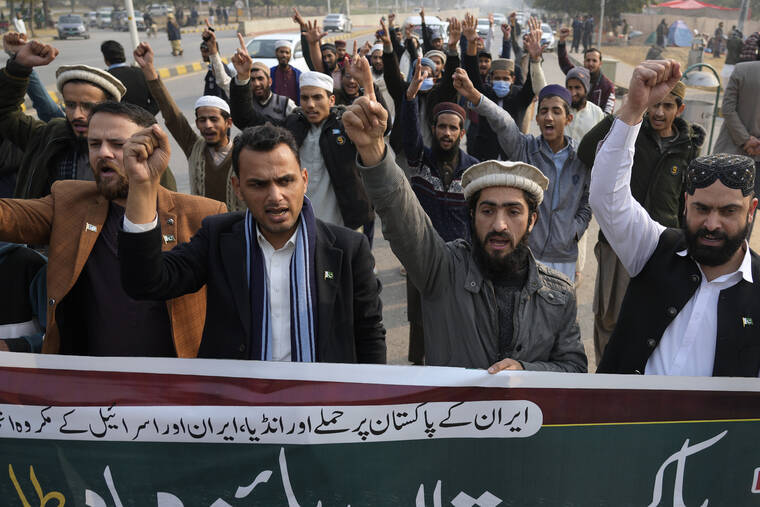Pakistani retaliatory strikes in Iran kill at least 9
ISLAMABAD — Pakistan launched airstrikes against alleged militant hideouts inside Iran on Thursday, killing at least nine people as it retaliated for a similar attack days earlier by Iran and raising tensions with its neighbor as conflict across the region escalates.
The unprecedented attacks by both Pakistan and Iran on either side of their border appeared to target Baluch militant groups with similar separatist goals. The countries accuse each other of providing a haven to the groups in their respective territories.
The flare-up between Iran and Pakistan comes as the Middle East remains unsettled by Israel’s war with Hamas in the Gaza Strip, and on the heels of Iranian airstrikes late Monday in Iraq and Syria. Those airstrikes were in response to a suicide bombing in Iran by Islamic State militants in early January that killed over 90 people.
Iran and nuclear-armed Pakistan have long regarded each other with suspicion over militant attacks, but analysts say this week’s tit-for-tat strikes were at least partially prompted by internal political pressures.
Iran is dealing with unrest against its theocracy and has faced pressure for action ever since the Islamic State suicide bombing. It is also seeking to flex military power at a time when militant groups it supports in the region — Hamas in Gaza, Hezbollah in Lebanon and Houthi rebels in Yemen — are engaged in the Israeli-Palestinian conflict.
Pakistan, meanwhile, could not leave Tuesday’s airstrikes by Iran unchallenged, and it faces a crucial February general election in which its military is a powerful political force.
“The government and military have been under immense pressure,” said Abdullah Khan, an analyst at the Pakistan Institute for Conflict and Security Studies. “Iran celebrated (Tuesday’s) attack in its media and the Pakistani public perception of a strong army is not as it used to be, so it had to respond.”
The U.S., China, the United Nations and others urged the two countries to de-escalate.
Pakistan’s Foreign Ministry described its attack Thursday as “a series of highly coordinated and specifically targeted precision military strikes.”
The ministry said in a statement it had “credible intelligence of impending large scale terrorist activities” and pledged “unflinching resolve to protect and defend its national security against all threats.”
Pakistan’s military described using drones, rockets, and “standoff weapons,” which are missiles fired from aircraft at a distance — likely meaning Pakistan’s fighter jets didn’t enter Iranian airspace.
Pakistan’s caretaker Prime Minister Anwaarul-Haq-Kakar cut short his trip to the World Economic Forum in Davos, Switzerland, to return home. Kakar is expected to meet Friday with the heads of Pakistan’s armed forces, its intelligence chief and other senior government officials.
Among the dead in Iran’s Sistan and Baluchestan province were three women, four children and two men near the town of Saravan along the Pakistani border, according to Ali Reza Marhamati, a deputy governor of the province. He said the dead were not Iranian citizens.
The Baluch Liberation Army, an ethnic separatist group that has operated in the region since 2000, said in a statement the strikes “martyred innocent Baluch people.”
Pakistan’s military said the strikes also hit targets associated with the Baluchistan Liberation Front, though that group did not acknowledge the claim.
HalVash, an advocacy group for the Baluch people, shared images online that appeared to show the remains of the munitions used in the attack. It said a number of homes had been struck in Saravan. It shared videos showing a mud-walled building destroyed and smoke rising from the strike.
Iran later summoned Pakistan’s charge d’affaires in the country. Pakistan already had withdrawn its ambassador over Tuesday’s attack.
Pakistan named its operation “Marg Bar Sarmachar,” which translates in Farsi to ”death to the guerrillas.”
Pakistan’s Baluchistan province, as well as Iran’s neighboring Sistan and Baluchestan province, have faced a low-level insurgency by Baluch nationalists for more than two decades.
However, the groups targeted this week are different. Jaish al-Adl, the Sunni separatist group that Iran targeted Tuesday, grew out of another Islamic extremist group known as Jundallah that was once alleged to have ties to al-Qaida. Jaish al-Adl has long been suspected of operating out of Pakistan and launching attacks on Iranian security forces.
The Baluch Liberation Army, which has no religious component and has launched attacks against Pakistani security forces and Chinese interests, is suspected of hiding out in Iran. The Baluchistan Liberation Front is similarly nationalistic.
The risk of escalation remained Thursday as Iran’s military begins a planned annual air defense drill from its port of Chabahar near Pakistan all across the south of the country to Iraq.
Iran and Pakistan share a 900-kilometer (560-mile), largely lawless border in which smugglers and militants freely cross. The route is also key to global opium shipments coming out of Afghanistan. The Taliban separately urged restraint amid the tensions.
For both Iran and Pakistan, the cross-border attacks renew questions about their own military preparedness, particularly their radar and air defense systems.
For Pakistan, such systems are crucial as tensions are always at a low boil with India, its nuclear-armed rival. Iran relies on those systems against potential strikes by its main enemy, the U.S.
There are also complex geopolitical considerations at play. Pakistan’s military relies on U.S., Chinese and French fighter jets for its air force — meaning some of those foreign weapons were used in Thursday’s attack.
Beijing, which urged restraint, has a major development project in Gwadar port in Pakistan’s Baluchistan province.
The U.S. also sought to ease tensions. “There’s no need for escalation,” said Matthew Miller, a U.S. State Department spokesman.
U.N. Secretary-General Antonio Guterres likewise urged both countries “to exercise maximum restraint to avoid a further escalation of tensions.”
———
Gambrell reported from Jerusalem. Associated Press writers Riazat Butt in Islamabad and Nasser Karimi in Tehran, Iran, and video producer Liu Zheng in Beijing contributed.

